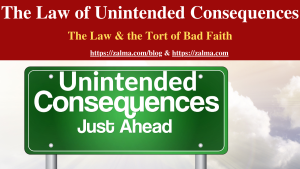The Law of Unintended Consequences

See the full video at https://rumble.com/v2pqn0a-the-law-of-unintended-consequences.html and at https://youtu.be/IoItdFL9brU
The law of unintended consequences is not statutory. No state or federal government has enacted it into law. No executive has signed the law. It is, rather, a law of the nature of people. It is an adage or idiomatic warning that an intervention in a complex system always creates unanticipated and often undesirable outcomes.
General observation requires the hypothesis that actions of people, especially of governments, will always have effects that are unanticipated or unintended, has been proved. Economists and other social scientists have heeded its power for centuries. Regardless, for just as long, politicians, insurers and popular opinion have largely ignored the law of unintended consequences to their detriment.
There is no common-law duty for a court, especially in a heavily regulated sector of the economy like insurance to create new rules. Every court should be loathe to invent duties unmoored to any existing precedent. The law of unintended consequences counsels against it.
To find a good illustration of the law of unintended consequences, one need look no further than the Supreme Court’s decision in Williamson County Regional Planning Comm’n v. Hamilton Bank of Johnson City, 473 U.S. 172, 105 S.Ct. 3108, 87 L.Ed.2d 126 (1985). The Court’s actual holding was pedestrian: that Hamilton Bank’s takings claim was unripe because the bank had not exhausted its administrative remedies, specifically its right to ask the County for a variance to develop the property in the manner proposed. In dictum, however—dictum in the sense that the Court’s pronouncement was at that point unnecessary to its decision—the Court went on to say that the bank’s claim was “not yet ripe” for a “second reason. That reason too was couched in terms of exhaustion: that under state law “a property owner may bring an inverse condemnation action to obtain just compensation for an alleged taking of property”; and that, until the bank “has utilized that procedure, its takings claim is premature.” The Court’s implicit assurance, of course, was that once a plaintiff checks these boxes, it can bring its takings claim back to federal court.
That assurance proved illusory. State-court judgments are things to which the federal courts owe full faith and credit. That obligation means that takings claims litigated in state court cannot be relitigated in federal. Thus—by all appearances inadvertently— Williamson County all but guarantees that claimants will be unable to utilize the federal courts to enforce the Fifth Amendment’s just compensation guarantee against state and local governments. [Lumbard v. City of Ann Arbor, 913 F.3d 585 (6th Cir. 2019)]
The law of unintended consequences applies as much in jurisprudence as anywhere else; bending a rule to accommodate one litigant doesn’t always achieve better justice — sometimes it just sows confusion in anyone trying to figure out what a court might do in other cases in the future. A prudent court will take the lesson to leave rulemaking to the legislators and administrators, even when the outcome appears unjust. The orderly development of the law is not without rough patches, but it is better than living under the law of unintended consequences. [United States ex rel. Prather v. Brookdale Senior Living Cmtys., Inc., 892 F.3d 822 (6th Cir. 2018)]
In addition, as one dissenter said that the majority’s desire to cure all wrongs by eviscerating the doctrine of governmental immunity, while well-intentioned, is fraught with the law of unintended consequences. Depriving governmental officials of governmental immunity when making policy decisions, when making sentencing decisions, and when running the government would certainly cause most of us to rethink the traditional notion of public service. [Doe v. Dep’t of Corr., 323 Mich.App. 479, 917 N.W.2d 730 (Mich. App. 2018)]
Courts will often work strenuously to avoid making decisions that will result in difficulties in the future by application of the law of unintended consequences which causes more problems than the decision may cure. My opinion is that the well intentioned creation of the tort of bad faith helped one insured only to cost hundreds of millions of dollars, if not a few billion, to those unaware purchasers of insurance who must pay more in premiums than they would had the tort not been created by the California Supreme Court.
Adapted from my book It’s Time to Abolish The Tort of Bad Faith
 (c) 2023 Barry Zalma & ClaimSchool, Inc.
(c) 2023 Barry Zalma & ClaimSchool, Inc.
Subscribe and receive videos limited to subscribers of Excellence in Claims Handling at locals.com https://zalmaoninsurance.locals.com/subscribe.
Consider subscribing to my publications at substack at https://barryzalma.substack.com/publish/post/107007808
Go to Newsbreak.com https://www.newsbreak.com/@c/1653419?s=01
Barry Zalma, Esq., CFE, is available at http://www.zalma.com and zalma@zalma.com
Follow me on LinkedIn: www.linkedin.com/comm/mynetwork/discovery-see-all?usecase=PEOPLE_FOLLOWS&followMember=barry-zalma-esq-cfe-a6b5257
Write to Mr. Zalma at zalma@zalma.com; http://www.zalma.com; http://zalma.com/blog; daily articles are published at https://zalma.substack.com. Go to the podcast Zalma On Insurance at https://podcasters.spotify.com/pod/show/barry-zalma/support; Follow Mr. Zalma on Twitter at https://twitter.com/bzalma; Go to Barry Zalma videos at Rumble.com at https://rumble.com/c/c-262921; Go to Barry Zalma on YouTube- https://www.youtube.com/channel/UCysiZklEtxZsSF9DfC0Expg; https://creators.newsbreak.com/home/content/post; Go to the Insurance Claims Library – https://zalma.com/blog/insurance-claims-library.
Like this:
Loading…
Related
About Barry Zalma
An insurance coverage and claims handling author, consultant and expert witness with more than 48 years of practical and court room experience.







